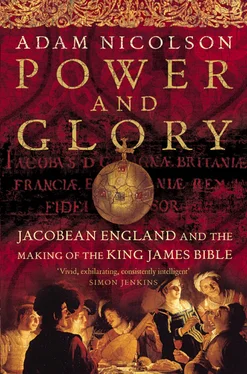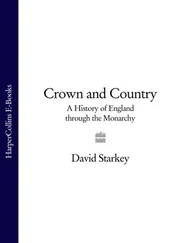James may have been rude, challenging and clever with the bishops. Now, he was even worse with the Puritans. The four âplaintiffsâ, as Barlow called them, were ushered into the Presence Chamber, where little ten-year-old Prince Henry was sitting beside his father on a stool. With them were Thomas Bilson, Bishop of Winchester, the most political of all courtier bishops, a member of the Privy Council, who scarcely ever visited his diocese except to administer oppressive justice and who with Miles Smith would play a critical role in the final stages of the translation, and Bancroft. No Henry Robinsons or James Mountagus, nor any other sympathetic bishops here: just the two hard-core royal apologists.
It must have been alarming. James told them: âhe was now ready to heare, at large, what they could obiect or say; and so willed them to beginne: whereupon, they 4 kneeling downe, D. Reynolds the Foreman beganâ. They were on the spot. James was famous across Europe as a theological disputant. Seventeenth-century hunting often involved the enclosing of semi-tame animals within the pales of a park and then slaughtering them at oneâs leisure, sometimes from a stand in front of which the animals would be driven. And now this too felt a little like another day at that strange, enclosed kind of chase.
It lasted five hours and the Puritans were humiliated. James sniped at them and pursued them into awkward corners, occasionally calling in Bilson and Bancroft, âand then for variety sake, rather then for necessityâ. The four Puritans tried to parry the blows. John Reynolds was âthe principall mouthe and speakerâ, Chaderton âmute as any fisheâ, Knewstubs spoke a little about his loathing of the cross (for which Lancelot Andrewes, at least in one account, took him to task) and the fourth, an obscure and moderate preacher called Thomas Sparke or Sparkes (who within a year or two would share with Bancroft the idea that bishops like kings were appointed by God), said hardly anything at all. But James was freewheeling through their points as though dancing in a kind of theological party. âWe have kept suche a revell with the puritanis heir these two days,â he wrote afterwards to the violent anti-Puritan and duplicitous crypto-Catholic, Henry Howard, Earl of Northampton.
I have pepperid thaime as soundlie, as ye have done the papists ⦠They fledde me so from argument to argument, without ever ansouring me directlie, ut est eorum moris [as is their way], as I was forcid at last to saye unto thaime, that if any of thaime hadde bene in a colledge disputing with thair skollairs, if any of thaire disciples hadde ansourid thaim in that sorte, thay wolde have fetchid him up in place of a replye & so shoulde the rodde have plyed upon the poore boyes buttokis.
Poor, dignified, generous Reynolds and Chaderton stood as if in the stocks, the royal squibs falling around them. Reynolds named the familiar abuses: the ceremony of confirmation, which had no basis in scripture, where adult baptism was the only recognised form of induction into the church; the use of the cross as a kind of magic symbol; the surplice â a papist joke, which clearly had nothing whatsoever to do with Christ, the apostles, or anything discoverable in scripture; kneeling at communion â another piece of superstitious symbolism, as though the bread and wine were indeed the blood and body of Christ, when it was an essential aspect of all Protestant thought that they were merely reminders of what had happened on the cross, not a magical re-enactment of it, and not to be bowed to. To Lancelot Andrewes, always insistent on the value of ceremony, this was absurd. Did Protestants pretend, he asked, that God âwill have us worship him like elephants, as if we had no joints in our knees?â
James dismissed all the Puritan objections. He was familiar with them all. They were the points which any Scots Presbyterian would have made and which strict English Protestants, dissatisfied with the compromise of the English Church, had been making since the 1550s. Everyone knew the territory; there were no surprises, but the atmosphere was nasty. These were moderate and distinguished men, suggesting moderate changes. But James â and Bancroft who seems to have been in an excitable state at the theatre unfolding around him â was treating them like extreme schismatics from the outer reaches of Anabaptist lunacy. Nothing like this had ever happened under Elizabeth, simply because Elizabeth, a more distant and less engaged monarch, basing her authority on the aura of that very distance, would not have countenanced it. James enjoyed the roughness of theological argument and Bancroftâs eyes must have been wide with delight.
Reynolds, who had never married, said he didnât like the phrase âwith my body I thee worshipâ, which formed part of the marriage service. James couldnât resist a vulgarity: âMany a man speaks of Robin Hoodâ, he said, âwho never shot his bow; if you had a good wife yourself, you would think that all the honour and worship you could do her were well bestowed.â It was said with a leery grin, the paterfamilias taunting the celibate. Reynolds said he didnât like the sign of the cross. James told him that by making such an objection he was playing into the hands of the papists.
Bancroft, after addressing the king on his knees, was then allowed to abuse the Puritans, calling them âschismatic scholars, breakers of your laws; you may know them by their Turkey grograinsâ, a concentrated insult from the beautifully and correctly dressed bishop. A âgrograinâ was a gown in grogram, a coarse cloth, part wool, part silk, often worn by merchants. These moderate Puritans, Bancroft was telling the king in his frenzy, were breaking the dress code. What else might they want to break? Was the body of the church safe in their hands? His remarks might be taken as a joke until it is remembered that Bancroft had been closely involved in the pursuit, arrest, interrogation and execution of all those Puritans and Separatists in the past whom he and Whitgift considered a threat to the English Church. It is the kind of joke that is made in totalitarian show-courts.
Reynolds then raised the question of church government. Should the bishop alone be judge and administrator in his diocese? Or could there be a kind of committee of other ministers to help him? That was Reynoldsâs reasonable meaning. But he used the wrong word. He must have cursed himself as it slipped out. Why shouldnât the bishops govern, Reynolds suggested, âioyntly with a Presbyterie of their brethren the pastors and Ministers of the Churcheâ. The word presbytery released a torrent in the king. A presbytery? âIf you aim at a Scots Presbytery, it agreeth as well with monarchie as God and the devil!â: âHe would haue the Presbitery buried in silence for these 7 yeares, and yf then he grewe idle, lasie, fatt, and pursie [short of breath], I will set vp a Presbitery (saith he) to exercise my body and my patience.â
This was the crux. Jamesâs experience of angry and threatening Presbyterians in Scotland, who endlessly and loudly promoted the theory that kings were subject to Godâs and so to the churchâs judgement, was never going to return to that. It was too challenging and too uncomfortable. The beauty of the Church of England, with its full panoply of bishops and archbishops, was its explicit acceptance of the king as its head. Bishops without a king, an episcopal republic, was perhaps a possibility. But a king without bishops, subject to a presbytery, was always in danger of being removed; it was a revolution waiting to happen. Bishops were the sine qua non of the kind of monarchy and church James needed, wanted and believed in. âNo bishops,â he told Reynolds furiously, âno king.â That, of course, was precisely the elision of the political and the religious points which the moderate Puritans had been anxious to avoid, and which the bishops, for months now, had been working to achieve. It meant one thing: the bishopsâ party had won.
Читать дальше












